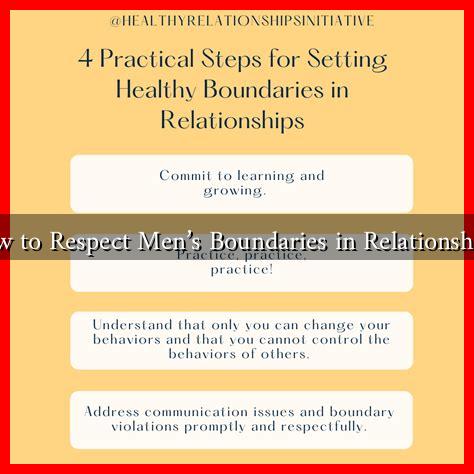-
Table of Contents
- How to Respect Men’s Boundaries in Relationships
- Understanding Boundaries
- Why Respecting Men’s Boundaries Matters
- Recognizing Common Boundaries
- How to Respect Men’s Boundaries
- 1. Communicate Openly
- 2. Listen Actively
- 3. Respect Their Space
- 4. Be Mindful of Physical Touch
- Case Study: The Importance of Boundaries
- Conclusion
How to Respect Men’s Boundaries in Relationships
In any relationship, understanding and respecting boundaries is crucial for fostering trust, intimacy, and mutual respect. While discussions around boundaries often focus on women’s experiences, it is equally important to recognize and honor men’s boundaries. This article explores how to respect men’s boundaries in relationships, providing insights, examples, and practical tips.
Understanding Boundaries
Boundaries are the limits we set for ourselves and others regarding what is acceptable behavior. They can be emotional, physical, or psychological. Understanding these boundaries is essential for maintaining healthy relationships. According to a study published in the Journal of Social and Personal Relationships, individuals who respect each other’s boundaries report higher levels of relationship satisfaction.
Why Respecting Men’s Boundaries Matters
Respecting men’s boundaries is vital for several reasons:
- Promotes Trust: When boundaries are respected, it fosters a sense of safety and trust in the relationship.
- Encourages Open Communication: Men are more likely to express their feelings and needs when they know their boundaries will be honored.
- Reduces Conflict: Understanding and respecting boundaries can prevent misunderstandings and conflicts.
Recognizing Common Boundaries
Men, like anyone else, have various boundaries that may differ from person to person. Here are some common boundaries to be aware of:
- Emotional Boundaries: Men may need space to process their feelings without pressure to share immediately.
- Physical Boundaries: Personal space and physical touch preferences can vary; some men may prefer less physical affection.
- Time Boundaries: Men may require time alone or with friends, which is essential for their mental health.
How to Respect Men’s Boundaries
Respecting men’s boundaries involves active listening, empathy, and clear communication. Here are some practical strategies:
1. Communicate Openly
Open communication is the foundation of any healthy relationship. Encourage your partner to express their boundaries and feelings. Use “I” statements to share your thoughts without sounding accusatory. For example:
- “I feel concerned when I don’t know how you’re feeling. Can we talk about it?”
- “I respect your need for space and want to ensure you feel comfortable sharing when you’re ready.”
2. Listen Actively
Listening is more than just hearing words; it involves understanding the emotions behind them. When your partner shares their boundaries, validate their feelings and show that you take their needs seriously. For instance:
- Paraphrase what they say to show understanding: “So, you need some time alone to recharge?”
- Acknowledge their feelings: “I understand that you feel overwhelmed right now.”
3. Respect Their Space
Everyone needs personal space, and it’s essential to respect that. If your partner indicates they need time alone, avoid pressuring them to engage. Instead, reassure them that you are there for them when they are ready.
4. Be Mindful of Physical Touch
Physical boundaries can vary significantly among individuals. Always ask for consent before initiating physical contact, and be attentive to your partner’s comfort level. For example:
- Before hugging or holding hands, ask: “Is it okay if I hug you?”
- If they seem uncomfortable, respect their feelings and back off.
Case Study: The Importance of Boundaries
A study conducted by the American Psychological Association found that couples who actively discuss and respect each other’s boundaries report higher relationship satisfaction. For instance, a couple named Sarah and Mike learned the importance of boundaries when Mike expressed his need for alone time after work. Initially, Sarah felt rejected, but after discussing it openly, she understood that Mike’s need for space was not a reflection of his feelings for her. This understanding strengthened their relationship.
Conclusion
Respecting men’s boundaries in relationships is essential for building trust, promoting open communication, and reducing conflict. By understanding common boundaries, communicating openly, listening actively, and being mindful of personal space and physical touch, you can create a supportive environment where both partners feel valued and respected. Remember, a healthy relationship thrives on mutual respect and understanding, making it imperative to honor each other’s boundaries.
For further reading on relationship boundaries, consider exploring resources from the American Psychological Association.




